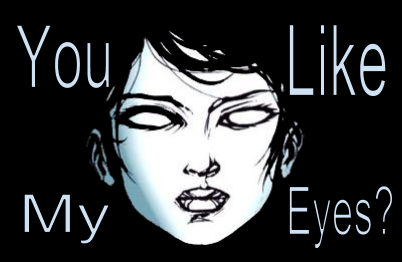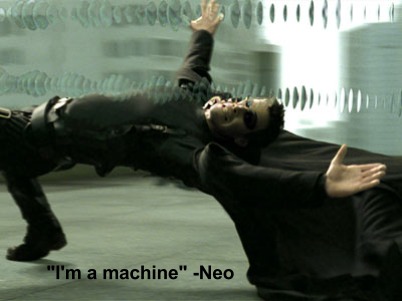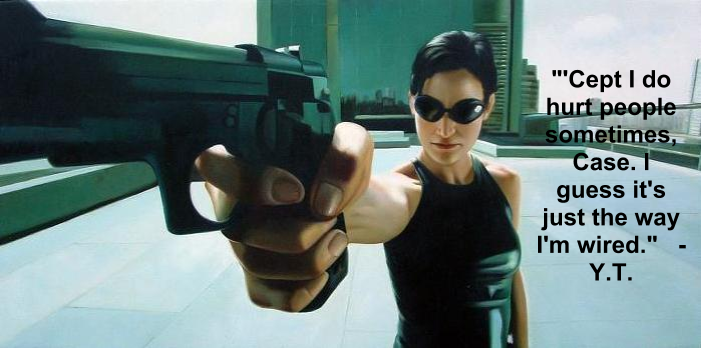The (Post)Humanist Matrix, Neuromancer, and Cyberpunk
Posted by on Thursday, May 3rd, 2012 at 10:10 amReading Neuromancer for the first time has, quite predictably, drawn me back to The Matrix. I have some familiarity with the cyberpunk genre (Snow Crash is one of my favorites), but Neuromancer reminds me even more just how many elements The Matrix borrowed from the genre, presumably in order to subvert it. And yes, this includes the term, “the matrix” itself, jacking in, Zion, the mirrored shades, and a lot more
As we discussed, The Matrix acts as a response to Neuromancer’s apparent indifference towards or even acceptance of posthumanism. While in The Matrix, the question on everyone’s mind is, “What is real?”, that question just doesn’t seem to matter in Gibson’s novel. Moreover, the question of what it means to be human is much more complicated in Neuromancer. Try contrasting Molly’s artificial mirrored lenses, not to mention her razors, with the plugs built into the humans of The Matrix. While in the novel, these “augmentations” largely viewed as positive, if a little creepy, enhancements of the self, the plugs in The Matrix are viewed as less than human, especially when compared to Tank and Dozer’s “homegrown” humanity.
You could argue that Molly’s augmentations arise from her own free will (as far as we know), while the plugs in the film only allude to the humans’ slavery to the machines. I wonder, then, whether any attempts have been made in the world of The Matrix to remove these plugs. If it were even possible, you could imagine some clinic in Zion dedicated to bringing Matrix-free humans back to humanity.
I may have contradicted my own point a little, but you definitely get the sense in Neuromancer that posthumanism is a reality whether you like it or not, while in The Matrix you see the characters fighting against this notion and turning back to the idea of an authentic humanity. Case, whose drug addictions almost cost him his life, is rewarded by the end of the novel with new organs, so he can continue altering his consciousness without consequence. Who benefits the most in the end? Wintermute! And you’re left unsure whether this is a good thing or a bad thing. But Gibson might argue that this is beside the point.
I could go on and cite all of the instances in which The Matrix emphasizes its humanist agenda, but we’ve discussed this in class already. Instead, I’d like to return to Neuromancer by focusing on the ways in which the Wachowski brothers’ film continues to borrow elements of the novel, even going so far at times to contradict, or complicate, its own definition of humanity. In other words, as much as The Matrix works in reaction against the postmodern, posthuman, cyberpunk genre, at times the film inadvertently supports the claims it tried to reject.
From the outset, the characters as well the audience privilege the unpleasant natural over the pleasant artificial simply because what is real matters to us. We reject the machines, then, as constructs rather than natural beings. And, of course, we reject the Matrix itself as an illusion, as opposed to the reality of the real world.
At times, however, the film complicates this value system by presenting the artificial as having clear advantages over the real. This shouldn’t surprise us, as Morpheus and the others work within the Matrix in order, presumably, to one day dismantle it. As Kathryn has already suggested, however, the end goal might not even be possible. By bending and breaking the rules of the Matrix better than the Agents, is Neo affirming his humanity, or only that he is a better machine than the machines (“you move like they do”)? As Tank downloads all of the combat training programs into Neo, he remarks, “He’s a machine.” What are we to make of this?
And then there is Agent Smith, whose own path in the second and third films mirrors Neo’s in many ways. In Baudrillard’s terms, if Neo is the remainder, Agent Smith is the subtraction of that remainder into reality (or is it the other way around?). As Neo’s story progresses, he sees more and more that Agent Smith is right: the only thing that matters is purpose. By submitting to fate, is Neo asserting his humanity, or is he admitting that human or machine, we are all programs with built-in purposes?
And then there is the fact that by the end of the third film, even after the war, the Matrix still exists. If Morpheus says in the first film that “as long as the Matrix exists, the human race will never be free,” why is everyone celebrating? Maybe because this compromise is the best deal humanity will ever get. As much as Neo and company despise the Matrix, they work pretty well within it, and it becomes essential to all of their schemes and eventually brokering a deal for peace in the end. So, I ask, is The Matrix a posthumanist work after all? For all of its privileging of an authentic humanity, the film casts Neo in the role of a machine, while giving human motives to Agent Smith. I wouldn’t go too far with this argument, but you can see that while The Matrix seemingly reacts against Neuromancer’s acceptance of posthumanism, a few of these ideas carry over after all.
(Note: Poor attempt at a meme. Photograph of Trinity, quote really by Molly, misattributed to Y.T. from Snow Crash).
You can follow any responses to this entry through the RSS 2.0 You can leave a response, or trackback.




